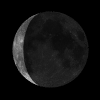Courtesy of EarthSky
A Clear Voice for Science
www.EarthSky.org

 Here are two bright morning objects again, Jupiter and the moon. If you contrast today’s chart with yesterday’s chart, you will see that the moon appears to the left of Jupiter on Monday morning (May 10), yet above Jupiter on Sunday morning (May 9).
Here are two bright morning objects again, Jupiter and the moon. If you contrast today’s chart with yesterday’s chart, you will see that the moon appears to the left of Jupiter on Monday morning (May 10), yet above Jupiter on Sunday morning (May 9).
How could it be otherwise? The moon is constantly moving in orbit around Earth, and this ceaseless motion translates to an eastward (leftward) motion across our sky from one day to the next. Since the moon is now a waning crescent, you will see the illuminated portion of the moon decrease in the coming mornings. New moon – when the moon will pass more or less between the Earth and sun – will come on May 14 Universal Time (May 13 according to U.S. clocks). Afterwards, the moon will reappear in the evening sky.
Jupiter wins acclaim for being the largest and most massive planet in our solar system, and it is very bright in our sky, always. This planet beams as the brightest celestial point of light in the morning sky right now. However, this world is not the brightest planet in our sky. That honor belongs to Venus. Presently, Venus appears in the west for a short while after sunset, and will continue to bedeck the evening dusk from now until early October.
Jupiter is rising before dawn right now. However, Earth will continue in its orbit around the sun, and we move faster than Jupiter in our smaller orbit. Earth will catch up to Jupiter and pass it on the inside track – as we do every year – this year on September 21. Around that time, Jupiter will appear opposite the sun in our sky – visible all night.
Written by Deborah Byrd
Astronomy Picture of the Day from NASA/JPL
U.S. Naval Observator Astronomical Information center
The York County Astronomical Society